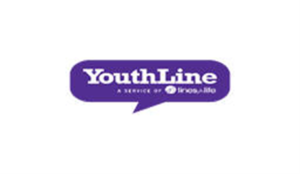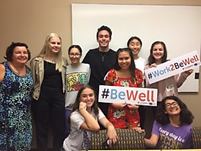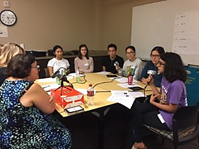
The YouthLine
A service of Lines for Life
YouthLine is a free 24-hour teen-to-teen crisis and support help line.
Vision
Our vision is to change the culture around mental well-being by empowering teens to give and get help. The peer experience is critical: youth best understand the experience of their peers because they are living the same experience, and they are uniquely situated to provide meaningful, impactful support for teens and young adults in crisis. At YouthLine, no problem is too big or too small. Volunteers are prepared to meet the needs of countless youth who are seeking supportive, affirming ears to help them through their most challenging moments.
YouthLine is a teen-to-teen youth crisis and support service provided by Lines for Life—a non-profit dedicated to preventing substance abuse and suicide. YouthLine operates a national service that provides crisis support and referrals via call, text, and chat. The YouthLine is answered by teen volunteers daily from 4pm-10pm PST (and by adults at all other times!). Translation services are available upon request.
History
In 1993, three nonprofit organizations formed Oregon Partnership — now Lines for Life, after a name change in 2012 — around a common need to help Oregon prevent substance abuse and intervene in substance-related crises.
Lines for Life is now a nationwide nonprofit providing prevention and intervention services to individuals struggling with substance abuse and suicidal ideation throughout Oregon and across the U.S. This is achieved through 24/7/365 crisis lines, including 988 (with specialized lines for youth, military service members/veterans, seniors, and people of color), operated by highly trained volunteers and staff. We assist callers struggling with addiction, mental health issues, and suicidal ideation to find a way forward through compassionate, confidential counseling, and where appropriate, referrals to treatment and/or support. We work with legislators, locally and nationally, through advocacy and shaping policy related to our mission, and are a leader in the field of prevention through innovative educational programs, national conferences, and outreach tailored to community needs.
Since 1999, the YouthLine, a service of Lines, for Life, has helped support young people, prevent youth suicide, and promote mental health. This program is one of only a few services in the country that provides a peer-to-peer crisis line support for young people. Teen and young adult volunteers and interns receive extensive training and mentoring to serve as peer counselors for other youth and are supervised by clinicians with extensive crisis experience. What began as a local hotline with nine youth counselors talking to 3,000 teens has grown to more than 130 youth volunteers who are helping over 24,000 youth contacts across the country. YouthLine is currently working to increase its capacity to provide help and support to even more youth.
Activities
The YouthLine meets four critical needs:
- Support young people in crisis by answering crisis texts, calls, chats, and emails The help, support, and crisis line is the hallmark of the program, where youth reach out through text, chat, phone, and email to seek help with whatever problem they are currently facing. Teen volunteers—who have received extensive training and mentoring—allow youth to express their problems without judgement, safety plan, provide resources, and brainstorm options for self-care. They collaborate with adult clinicians to deescalate crisis and explore next steps with contacts for addressing their current challenges.
What do youth reach out for help with? Youth contact us with anything that may be bothering them. No problem is too big or too small for the YouthLine! Some of the things we talk with youth about are:
-
- Relationship challenges and family issues
- Feeling depressed or high stress/anxiety
- Engaging in self-harm, thinking of suicide, or actively suicidal
- Sexual identity
- Abuse
- Bullying
- School challenges
- Feeling lonely or isolated
What Teens Can Expect When Calling YouthLine
We know that talking about what’s bothering you can be difficult and scary. Talking to someone at YouthLine may be the first time you say out loud what it is you’re going through. When you call us, we listen, support, and keep what you share to ourselves.
What happens when you call? We’ll probably ask your name and what you want to talk about, and we’ll listen. We won’t give you advice or tell you what to do. Instead, we’ll work with you to figure out next steps or just listen while you talk things out. If it’s helpful, we may tell you about places to get more information or where you can find long-term help. We’ll work really hard to make this a safe and comfortable conversation. YouthLine is for those ages 11-24. If that doesn’t match you, we’ll get you over to our organization’s adult crisis line. Translation services are available, upon request.
Here are things we don’t do: We won’t judge. We won’t tell you what to do. And we won’t tell you that your feelings are dumb or unreasonable—because they aren’t. YouthLine’s teen volunteers are here to listen to you, to help you know that your feelings matter, and to help you feel better.
- Provide a youth development program. YouthLine volunteers are the backbone of the program. The youth and workforce development component of YouthLine prepares teens and young adults to serve as Peer Crisis Intervention Specialists.
Every year approximately 6 cohorts of student volunteers are trained. Training consists of over 65 interactive classroom training and job shadowing hours for each YouthLine volunteer. Training includes lessons on topics such as awareness of mental health issues like anxiety or depression, cultural responsiveness, supporting survivors of sexual violence, active listening skills, substance abuse and addiction, grief and loss, suicide intervention and awareness, and more. YouthLine volunteers get a chance to roleplay phone conversations throughout the training and participate in team-building activities to help connect them to their fellow volunteers.
- Provide classroom education and community outreach.
Working to build help-seeking skills with upstream prevention, YouthLine volunteers and staff also deliver classroom prevention education and community outreach for thousands of young people every year. YouthLine staff partner with our youth volunteers to provide presentations in local schools to increase awareness of the program, destigmatize talking about mental health, build skills and knowledge for middle and high school students, and promote help-seeking behaviors among today’s youth. Youth volunteers provide an essential peer voice and perspective in its outreach, enhancing evidence-based mental health and wellness curriculum in classroom lessons that are coordinated with teachers. Curriculum includes lessons around challenging subject matter including “Understanding Stress, Bullying, Decision-making and Suicide.”
- Support workforce development, training young people in mental health support and giving them substantial experience that can form the basis for advanced education and career.
Many YouthLine volunteers are set on a trajectory to future mental health careers. In addition to over 65 hours of pre-service training, youth volunteers receive regular continuing education and professional development to ensure they remain prepared to best serve their peers who reach out. Youth receive ongoing mentoring and individualized feedback to enhance their skills during their tenure with the program. Most importantly, youth gain numerous life skills that they can use in their lives outside of their volunteer role – in classrooms, at home, and in their workplaces.
There is great need for a pipeline of mental health professionals including therapists, social workers, psychologists, and mental health providers at all school levels. YouthLine volunteers have gone on to choose college majors and career paths into the mental health field, expanding the needed behavioral health workforce in the United States.
Work Study positions are also available for youth 15-20 years old who may face social or financial barriers to participating in volunteer work with YouthLine. Eligible youth who are accepted into the Work Study program receive a stipend of $250 per month for one year.
Many of our YouthLine professional staff were once student volunteers. They continue to be avid supporters of the program.


Teens from the YouthLine and the Well Being Trust student advisory group discuss issues of suicide and self care and coping with Dr. Robin Henderson on the Talk2BeWell podcast.
Successful Impact
Over the last decade, the YouthLine has grown exponentially. The YouthLine now has two call centers in Oregon. The contact volume on the line reached over 24,000 in 2022 from less than 5,000 contacts per year in 2013. The youth volunteer participation included over 190 teens and young adults this past year.
In 2022 alone, YouthLine staff work with a total of 193 teens and young adults who volunteered on YouthLine. Collectively they contributed 23,479 hours to support youth who are struggling; with an average of 122 hours per volunteer each year.
Through education and outreach, the YouthLine participated in mental health related school workshops providing informational and skill building lessons for more than 50 schools across Oregon. Specific information around classroom lessons can be found on our website at www.theyouthline.org/our-lessons/
YouthLine also provides materials for schools such as posters, wallet cards and informational brochures promoting mental health and can be ordered at https://www.theyouthline.org/materials/. Materials are free with a minimum shipping charge.
What Teens Are Saying about YouthLine
-
- Still not sure you should contact YouthLine? Here’s what young adults who have talked to us had to say:
- I am so thankful I contacted you guys. I was really able to talk through everything and she had a similar experience with what I was going through so it was really easy to talk to her. I am glad I got here.
- They were amazing. A life saver. I was happy to have someone to talk to in my darkest time.
- Amazing quality. I Love YouthLine. you guys always help me when I need it! Thanks.
- You guys are amazing!!! I have never been helped like that and truly love YouthLine.
- If y’all weren’t here, neither would i be here.
- It was nice to have someone who will actually listen and not judge. I will use this site if I ever feel this way again.
- Wonderful. Attentive, kind, thoughtful, and helpful.
- Service was amazing and really made me reconsider things. The person I talked to was courteous and really seemed to understand what I was going through.
- They were very nice and helpful. I feel much better and they gave me resources to get help.
- It was amazing thank you soooo much i feel a lot better.
- Very understanding and helpful. Provided a good ear for listening and helped me get my feelings out.
- The person I talked to was really nice and he gave me some clarity as to what i was looking for very helpful service. Thank you!
YouthLine has been very well received by school and community partners. For example, Bend-La Pine Schools expressed how YouthLine can be “a transformational experience” for their students and noted that some of their students have committed to pursuing careers in mental health after volunteering for YouthLine.
Time and time again, YouthLine’s impact on youth is life changing. Like a pebble in a pond, the ripples from each trained volunteer spread out through each young adult’s community.
Over the last decade, the YouthLine has grown exponentially. The YouthLine now has two call centers in Oregon. The contact volume on the line reached over 24,000 in 2022 from less than 5,000 contacts per year in 2013. The youth volunteer participation included over 190 teens and young adults this past year.
Example of YouthLine Podcast
“COVID, College, and Making It Through” Posted August 21, 2020
Our own YouthLine volunteer describes the difficulties of entering Senior year
in a world of shifting uncertainties!
A reminder that YouthLine is an essential service during the COVDI19 shutdown. Teen volunteers are here to answer calls, texts, and chats from 4pm-10pm PST every day. Adults answer calls at all other times. Reach out if you need support!
Everyone is experiencing this pandemic differently. For some, their home life, lack of extracurriculars, or limited access to friends has made this time particularly difficult. For others, time spent on themselves have revealed hidden benefits these past months. For us seniors applying to college, it’s a little bit of both.
As I write this, I have about 20 tabs open on my computer related to college in some way – from looking at their responses to COVID, dining halls, to my ever-changing college list. My friends and I, when we’re not griping about our near guaranteed loss of senior year, are agonizing over our supplementals, potential test scores (IF we get to take our tests at all), and how we’ll stack up against other applicants. Granted, this is partly connected to the very competitive culture of our high school – but from what I’ve heard from most of my friends at other schools, we’re all pretty freaked out about college applications in the era of COVID.
There are the undeniable pluses of applying in this time – virtually every school going test optional, an increase in online admissions resources, and a more “holistic” and personalized review of applications by colleges everywhere. But there are also drawbacks – navigating how to achieve at the same level when school goes remote long term, trying to anticipate how admissions teams will evaluate your application when missing much more information than usual, and of course, wondering if and when you’ll actually be able to attend whatever college you ultimately choose.
One of the hardest parts of this pandemic for me has been the constant usage of screens. It’s not that they weren’t interwoven into my day pre-COVID, because they were – I always had my phone on me and an assignment open on my laptop. But my day wasn’t centered around screens, and spending all day staring at my computer is something that personally really affects my mental health. So for me, there’s an added layer of difficulty in motivating myself to write my college applications when my day consists of mostly me doing work at my computer. Not to mention, the copious amount of college application videos on YouTube that highlight not just how different admissions will be this season, but also feed into a comparison of myself to an idealized version of others – which is all too common when everyone’s on social media so frequently. Combine my constant Zoom calls with my access to videos of applicants with seemingly perfect stats and extracurriculars, and college applications become scary in a whole new way.
We all have these tendencies and parts of ourselves that make our college processes uniquely challenging for us. It can feel really lonely to assume you’re the only one struggling to get started or figure out your application. I’m here to tell you, you’re not alone. However you’re feeling about your college application experience is completely valid, and everybody else is in the same situation. Don’t forget, on top of the normal stress, we’re literally navigating a time unlike any other in human history! Give yourself grace, and remember you are so much more than whatever this pandemic has thrown at you, or what you put down on paper for your college applications. And, if you ever want support, we’re always here to talk at the YouthLine.
Recommendations for Adaptation and/or Replication
-
- Each location has different needs that should be defined by local program organizers. YouthLine can act as an advisor. YouthLine could work with staff to deliver mental wellness related classroom messaging and learning.
- Youth development training program is critical to a hotline for youth. This needs to be well designed to help student volunteers learn how to use active listening to pick up cues from callers, how to help callers come up with own strategies for self-care, how to respond in ways that are culturally sensitive, and more.
- Develop a public relations/marketing plan that lets youth and others know about the services.
- Review program on a regular basis to define strengths and weaknesses and make changes as necessary.
For more information about the YouthLine, contact:
Emily Moser, Director of YouthLine Programs
Emilym@linesforlife.org
Visit the website: www.theyouthline.org
